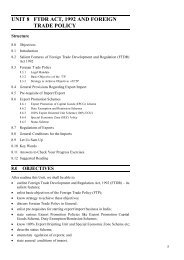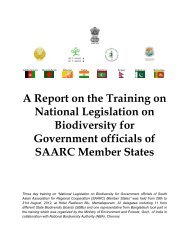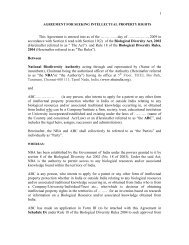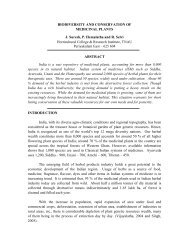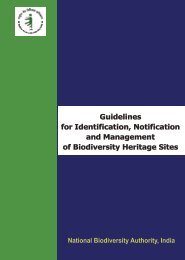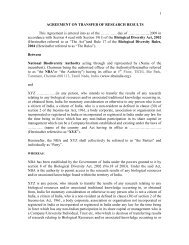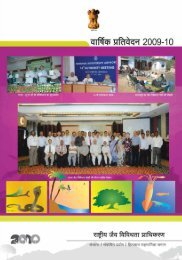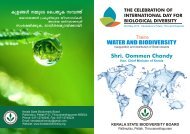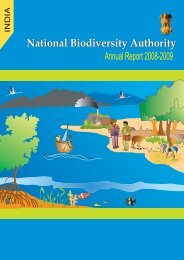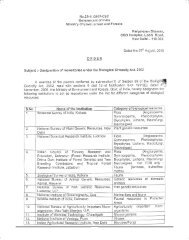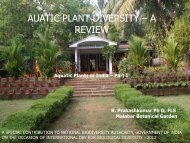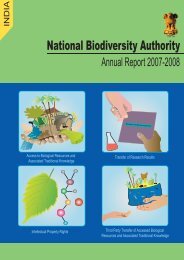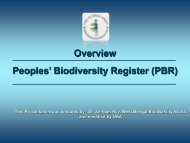CBD First National Report - India - National Biodiversity Authority
CBD First National Report - India - National Biodiversity Authority
CBD First National Report - India - National Biodiversity Authority
You also want an ePaper? Increase the reach of your titles
YUMPU automatically turns print PDFs into web optimized ePapers that Google loves.
specially for supporting biodiversity researchthroughout the country.Public Education and Awareness2.69The Supreme Court of <strong>India</strong> has ruled thateach day, seven minutes of broadcast time on thenational television network should be devoted toenvironment related programmes. MoEF has setup an Environmental Information System (ENVIS)to collect and disseminate information to researchersand the public through a network of 21 centres inthe country. Twelve of these centres can beaccessed through e-mail. ENVIS functions as a<strong>National</strong> Focal Point and a Regional Service Centrefor the South Asian Sub Region Countries forINFOTERRA network,. a global informationnetwork of the UNEP. ENVIS has also beendesignated as the <strong>National</strong> Focal Point ofSustainable Development Network Programmingof UNDP. ENVIS serves as the Clearing HouseMechanism for <strong>CBD</strong> in <strong>India</strong>. It maintains a closeliaison with other national information systems like<strong>National</strong> Information System on Science andTechnology (NISSAT) and BiotechnologyInformation System (BTIS).<strong>National</strong> Environmental Awareness CampaignThe <strong>National</strong> Environmental Awareness Campaign (NEAC) was started by MoEF in 1986for creating environmental awareness at all levels of the society. Twenty seven organisationslocated throughout the country have been designated as Regional Resource Agencies forassisting MoEF in this campaign. Besides helping MoEF, these Agencies are also responsiblefor monitoring and evaluating the activities conducted by the various organisations under theNEAC.A large number of NGOs, schools, colleges, universities, research institutions, women and youthorganisations, army units, State Government Departments and others throughout the country areprovided financial assistance for conducting a variety of public awareness programmes. Diversetarget groups ranging from students, youth, tribals, rural populations, professionals and others arereached through the campaign.2.70 MoEF interacts actively with the UniversityGrants Commission (UGC), <strong>National</strong> Council ofEducational Research and Training (NCERT) andthe Ministry of Human Resources Development(MHRD) for introducing and expandingenvironmental concepts and issues in the curriculaof schools and colleges. In the area of formaleducation, the <strong>National</strong> Policy on Education, 1986stresses on creating consciousness about theenvironment. NCERT has been assigned theresponsibility of developing a prototype syllabi andinstructional material in ten core curricular areas, ofwhich protection of environment is one. The Ministryof Human Resource Development has launchedthe Environment Orientation to School Educationscheme, wherein special cells are created in thestate departments ofeducation for environmental38education. Support is also extended through thiscell to NGOs to facilitate the development oflocale-specific programmes and materials.2.71 Some of the initiatives taken by MoEF inpromoting Environment Education and Awareness(EE&A) through non-formal media and methodsare :0000The <strong>National</strong> Environmental AwarenessCampaign.Establishment of Centres of Excellence inEnvironmental Education.Establishment of <strong>National</strong> and RegionalMuseums of Natural History.Setting-up of Eco-clubs in Schools.



